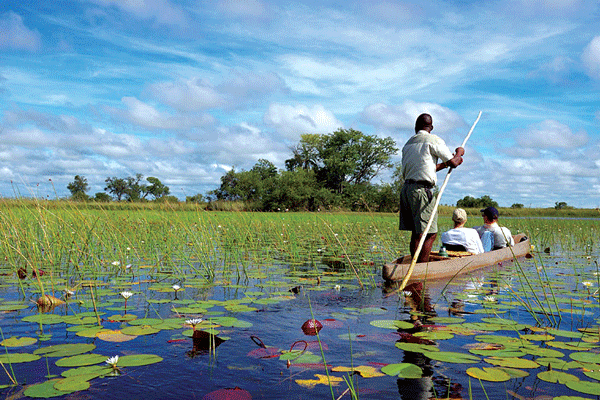
Botswana has seen its economy ravaged by heavy droughts that have ploughed through the region over the last eight months. And while the disaster has seen taps run dry in its capital, Gaborone, nowhere is the driest season in over 30 years more evident than in the Okavango Delta, a Unesco World Heritage site where, as a result, tourism has withered. africanbusinessmagazine.

Located in the northwest of Botswana, the Okavango Delta has drawn thousands of tourists to one of the world’s largest inland deltas.
While known for its beauty, the Okavango Delta is also home to vulnerable species including cheetahs, white and black rhinoceros and lions. Botswana is home to the largest population of elephants in the world with numbers sitting at around 50 000 in the Chobe and Okavango areas.
The changing climate combined with a severe El Niño season has caused one of the driest spells in decades. Rainfall is scarce and sporadic.
Edwin Mosimanyana, a hydrologist at the Okavango Research Institute based in the tourism town of Maun, says while the water in the Delta usually recedes around this period, this time it is different.
“We began seeing a decline in water levels earlier than usual, and this is mostly due to the lack of floods from the Angolan highlands. Drought has adversely affected the whole region.”
Mosimanyana highlights that in some areas that would historically be flooded, water levels have receded so quickly that small boats could not make it through the swamps.
The Okavango Delta makes a significant contribution to a tourism industry in Botswana worth over US$500 million — a much-needed respite for a country hit by the collapse in commodity prices.
- Chamisa under fire over US$120K donation
- Mavhunga puts DeMbare into Chibuku quarterfinals
- Pension funds bet on Cabora Bassa oilfields
- Councils defy govt fire tender directive
Keep Reading
Transporting people around the swamps in mekoro (canoes) is a moneymaker for locals.
“The tourism industry around the Delta has been feeling the effects because since December, some activities, such as boat cruises, have completely stopped,” says Mosimanyana.
Indeed, the effects of low water levels have been widespread, “directly affecting the local communities who have survived on the water systems around them”, he says.
“Water for livestock has also been a challenge as farmers depend on the rivers around here and they have been forced to look around for water further afield for their animals. This state extends to the day-to-day use of water by the communities, and should the situation continue, it will have devastating effects for this whole area,” says Mosimanyana.
The situation has made Arnold Mothobe, a junior guide from Xhaxhaba, an island village within the Delta, nervous.
“This is the lowest I’ve seen the Delta, there just isn’t any water coming from the flood plains,” he says.
Mothobe worries that, without the rains, he will struggle to make ends meet.
“Guiding tourists is what I depend on. Should things continue this way, I don’t know where things will stand. We will be devastated as a community.
“We are people of the river and it’s all we know, so it is worrying seeing water levels like this at a time we had expected it to be a lot higher,” he says.
He is not the only concerned local.
Elijah Lesole, a boat captain who has ferried world travellers across the Delta for over 20 years, paints a similar picture.
“It was a struggle getting people around in the peak period, we would get our boats stuck on sandbanks.
“Now it’s totally impossible to get boats in the channels from Maun, leaving us with little work. Now people fly in chartered light aircraft.”
Botswana’s Minister of Environment, Wildlife and Tourism, Tshekedi Khama, says while he is worried, he remains optimistic that the rains will eventually come.
“We are very concerned about the low inflows into the Delta, it’s another sign of how devastating this drought season has been, not only to people but also to the vegetation that makes up our tourism industry.
“However, I remain optimistic that the highlands will flood again,” he says.
He notes that the water levels in the Delta were the lowest recorded in recent history and that the low water levels have also altered the migration patterns of wildlife due to their search for wetland.
The ministry is concerned that if the situation continues, there could be increased conflict between animals and the human populations in surrounding areas.
“As such we are planning to dig boreholes in and around the park,” says Khama.
“This will help water the large number of animals, especially the exceptionally high number of elephants that are in the Delta.”
Khama states while the flood plains have receded significantly, tourism numbers are still up.
“The Delta has a unique offering, so while everyone who depends on the Okavango for their livelihood has every right to be concerned about the situation, tourists from afar still want to see this magnificent wonder and that gives me optimism that the future of Botswana tourism remains intact.”











